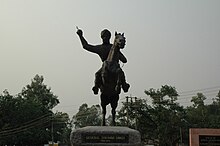Zorawar Singh Kahluria
| Zorawar Singh Kahluria | |
|---|---|

A statue depicting Zorawar Singh
|
|
| Born | 1786 Bilaspur, Kahlur, Himachal Pradesh, India |
| Died | 1841 Tibet |
| Allegiance |
Gulab Singh of Jammu (subsidiary to the Sikh Empire) |
Zorawar Singh Kahluria (1786-1841) was born in Kahlur State in Bilaspur, Kahlur. In reference to his legacy of conquests in the Himalayas including Ladakh, Tibet, Baltistan and Iskardu as General and Wazir (Minister), he has been referred to by historians as "Conqueror of Ladakh" and the "Napoleon of India".
He was born into a Hindu Dogra Rajput family of Kahlur state in modern-day Himachal Pradesh, they migrated to the Jammu region where, on coming of age, Zorawar took up service under Raja Jaswant Singh of Marmathi (modern Doda district). Zorawar Singh was employed by the ambitious Raja Gulab Singh of Jammu and was placed under the commandant of the Reasi fort (Bhimgarh fort). While delivering a routine message to the Gulab Singh, Zorawar told him of the financial waste occurring in the fort administration and boldly presented his own scheme to effect savings. Gulab Singh was impressed by Zorawar’s sincerity and appointed him commandant of Reasi.
Zorawar Singh fulfilled his task and his grateful ruler made him commissariat officer of all forts north of Jammu. He was later made governor of Kishtwar and was given the title of Wazir (minister).
Even though it was a newly conquered region Zorawar had no trouble in keeping the peace; many of the local Rajputs were recruited into his army. In 1835 the nearby region of Paddar was taken from Chamba (now in Himachal Pradesh) in the course of a battle. Paddar later became known for its sapphire mines. But this was a mere sideshow to General Zorawar Singh’s more famous expeditions, on which he had already embarked in the previous year.
...
Wikipedia
